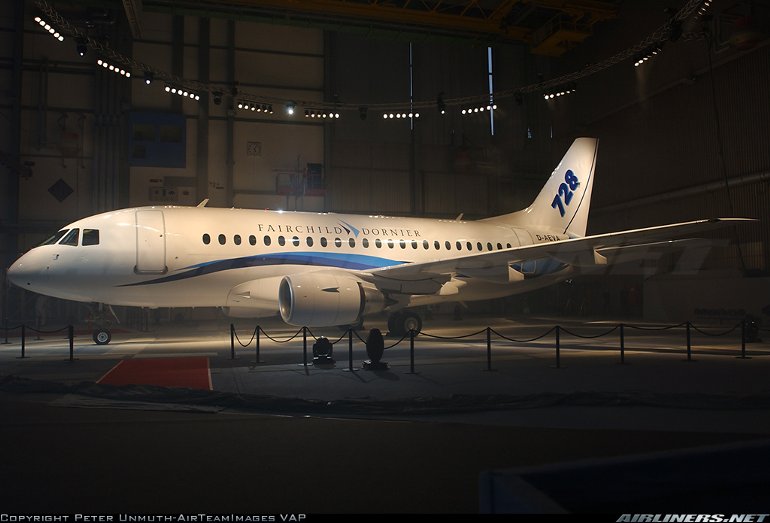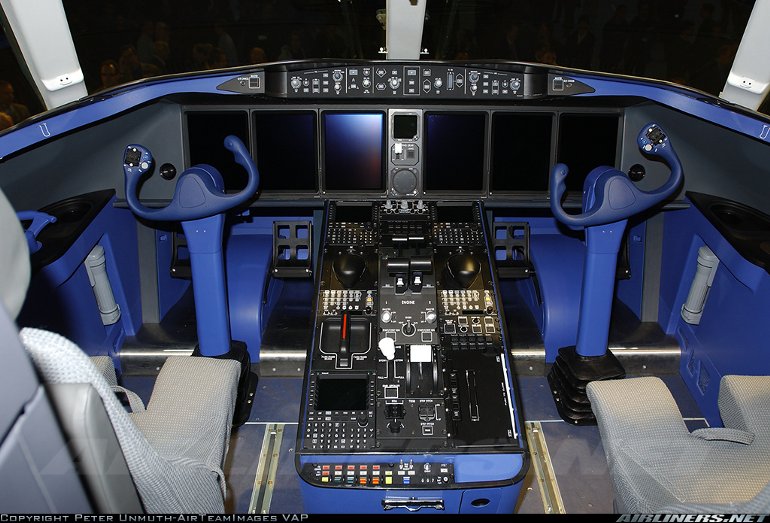Aircraft Technical Data
Fairchild Dornier 728


| Details | |
| Country of Origin | Germany |
| Type | Regional jet airliner |
| History | The 728 family was Fairchild Dornier's ambitious bid to develop a range of regional jet airliners to supplement the smaller 328JET series, and attracted strong airline interest when launched. Fairchild Dornier launched this new family of regional jets seating from 55 to 100 passengers on May 19 1998, with provisional launch orders from Crossair and Lufthansa for 120 new aircraft. The lead aircraft in the program was the 70 to 85 seat 728 (previously named 728JET), which made its official roll-out on March 21, 2002, and it was scheduled to make the first flight in the summer of 2002. Deliveries should have started in mid 2003 to Lufthansa Cityline. In August 1998 Fairchild announced it had selected General Electric's FADEC equipped CF34-8D (which has 87% parts commonality with the CF34-8C1 selected to power the competing CRJ-700) ahead of the SNECMA/Pratt & Whitney Canada SPW-14 to power the 728. In September '98 further 728 suppliers were announced, including Honeywell for its Primus Epic integrated EFIS avionics suite with flat panel LCDs, AlliedSignal (APU and environmental control system), Lucas Aerospace (for a fly-by-wire flight control system), BFGoodrich (landing gear, wheels, tyres, brakes and fuel system), Hamilton Sundstrand (integrated electric system), and Parker Aerospace (hydraulics). CASA would build the wings and empennage. The base version of the 728 was the 728-100, which would have been followed end 2003 by the extended range and higher payload 728-200. The 200 would have had a 3000kg (6615lb) higher MTOW and a 750km (400nm) increase in range. In its class, the 728 had the largest cabin (0.51cm wider than the Embraer 170/190, and 0.70cm wider than the CRJ-700) with five-abreast seating. Following the 728 into service would have been the stretched 95 to 110 seat 928, with first flight scheduled in late 2003, and entry into service in 2005. Apart from the stretched fuselage - cabin length from behind the flightdeck would have been 23.05m (75ft 7in) allowing seating for 95 to 110 passengers - it would also have featured an increased span wing. The shortened 55 to 65 seat 528 (23.38m (76ft 9in) fuselage length and 15.84m (52ft 0in) cabin length) would have followed the 928. The three types would have featured a high degree of commonality, including engine type, and the same flightdeck, allowing a common pilot type rating. Fairchild Dornier also launched a corporate jet version of the 728, the Envoy 7, which was foreseen to enter service in 2004. The Envoy 7 had intercontinental range and would be equipped with Fairchild Dornier's "Super Shark" winglets. Corporate versions of the 528 and 928, the Envoy 5 and Envoy 9 respectively, were also planned. Eight customers, among them Lufthansa Cityline, GECAS, Bavaria Leasing, CSA-Czech Airlines, and SolAir, had (by March 2002) placed firm orders for 125 aircraft and signed options for an additional 164. However, before the first flight of the 728 had been made, Fairchild Dornier filed for insolvency on April 2 2002, and the whole ambitious program came to an end. |
| Powerplants | 728 - Two 55.6kN (12,500lb) General Electric CF34-8D1 turbofans. Envoy 7 - Two 58.1kN (13,050lb) General Electric CF34-8D6 turbofans. |
| Performance | 728 (provisional) - Cruising speed at 37,000ft Mach 0.81 or 852km/h (460kt). Max speed M0.82. Takeoff field length at MTOW 1463m (4800ft), landing length 1420m (4659ft). Max operating altitude 41,000ft (12,497m). Range 2550km (1400nm) for the 100, 3300km (1800nm) for the 200, and 7400km (4000nm) for the Envoy 7. |
| Weights | 728 - Max takeoff 35,990kg (79,343lb) for the 100, 37,990kg (83,754lb) for the 200. Max payload 8554kg (18,860lb) for the 100. Envoy 7 - Max takeoff 39,500kg (87,082lb). Max payload 5576kg (12,293lb). |
| Dimensions | 728 - Wing span 27.12m (89ft), length 27.04m (88.8ft), height 9.05m (29.8ft). Fuselage width 3.25m (10.8ft). |
| Capacity | Flightcrew of two, cabin crew of two. 728 - typical seating for 70 to 85 passengers at five abreast. 528 - 55-65 passengers. 928 - 95 to 110 passengers. Envoy 7 - two flightcrew, one flight attendant, and 14-18 passenger seats. |
| Production | 728 - 1 built, but not flown. |
| Related Links | Fairchild Dornier 728 |
The backbone of this section is from the The International Directory of Civil Aircraft by Gerard Frawley and used with permission. To get your own copy of the book click here. |
|








